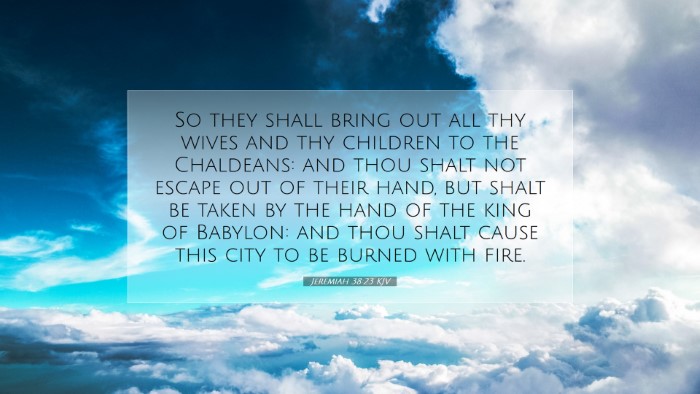Jeremiah 38:23 Commentary
Verse Text: "So they shall bring out all thy wives and thy children to the Chaldeans; and thou shalt not escape out of their hand, but shalt be taken by the hand of the king of Babylon: and thou shalt cause this city to be burned with fire."
Introduction
The message in Jeremiah 38:23 marks a significant moment in the prophet Jeremiah's ministry, illustrating the dire consequences of disobedience and the impending judgment upon Jerusalem. This verse encapsulates both the personal judgment on Zedekiah and the broader fate of the people of Judah. As we delve into the insights from notable public domain commentaries, we will explore the implications of this verse for contemporary readers, including pastors, students, theologians, and Bible scholars.
Exegesis of Jeremiah 38:23
Contextual Background
Historical Context: This chapter sits within the historical narrative of Jeremiah’s ministry during the Babylonian siege of Jerusalem. Zedekiah, king of Judah, was warned repeatedly by Jeremiah about the impending fall of Jerusalem, yet he chose to ignore the prophet’s counsel.
Theological Significance: The verse reflects themes of divine judgment and human accountability. The consequences of Zedekiah's decisions not only affect him but also his family and the city itself.
Commentary Insights
Matthew Henry’s Commentary
Henry emphasizes the tragic fate awaiting Zedekiah and his family. His insights highlight the inevitability of divine judgment due to Zedekiah's rebellion against God's word conveyed through Jeremiah. He notes that the king's attempt to escape judgment leads to greater calamity, illustrating the futility of resisting God’s decree.
- Divine Retribution: Henry points out that God's warnings are not made lightly; they come with significant gravity. Zedekiah’s failure to heed these warnings results in a harsh reality.
- Impact on the Family: The mention of his wives and children underscores the communal aspect of sin, where the actions of a leader have profound effects on those they govern.
Albert Barnes’ Notes on the Bible
Barnes elaborates on the literal interpretation of the verse, explaining the consequences that await Zedekiah for his disobedience. He focuses on the phrase "thou shalt not escape," emphasizing that refusal to follow God's command leads to unavoidable fate.
- Loss of Power: Barnes articulates that Zedekiah’s desire for independence from Babylon ultimately becomes his downfall, affirming the idea that earthly powers are under God’s sovereignty.
- Covenant Consequences: By failing to maintain the covenant relationship with God, Zedekiah inadvertently seals his fate and that of his lineage.
Adam Clarke’s Commentary
Clarke provides additional historical context, noting the psychological despair Zedekiah faces. He illustrates how the king’s leadership is riddled with fear and poor decisions, leading him further into despair.
- King’s Desperation: Clarke discusses Zedekiah's internal conflict and fear of the Babylonians, portraying him as a tragic figure ensnared by his choices.
- Consequences of Leadership: He solidifies the point that leaders are held to a higher standard, and their actions reverberate throughout their communities.
The Broader Implications of Jeremiah 38:23
This verse serves as a somber reminder of the consequences of disregarding divine authority. For pastors and theologians, it underscores the importance of teaching about obedience and the realities of judgment. It invites a reflection on leadership and the broader impact of individual decisions.
Lessons for Today's Church
- Awareness of Judgment: The church today must heed the warnings of scripture and focus on the gravity of their commitment to God.
- Responsibility of Leadership: Leaders are called to guide their communities with integrity and truthfulness, understanding their actions can have lasting implications.
- Call to Repentance: Just as Jeremiah called for acknowledgment of sin, the church is urged to maintain a posture of repentance, aligning their lives with God’s will.
Conclusion
Jeremiah 38:23 encapsulates a critical moment filled with warnings and inevitable consequences for disobedience. As we examine the insights from revered commentaries, we are reminded of the importance of heeding divine instruction, the weighty responsibility of leadership, and the communal ramifications of personal choices. This verse not only caters to historical and theological reflection but also serves as a contemporary exhortation for the church, calling for a deeper understanding of God’s purposes and a commitment to His word.


